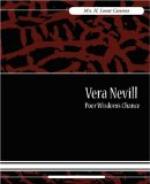“Thou shalt not bear false witness,” said the same Voice who has also said, “Thou shalt do no murder.”
And which is the worst—to kill a man’s body, or to slay a man’s honour, or a woman’s reputation?
In truth, there seems to me to be but little difference between the two; and the man or the woman who will do the one might very possibly be guilty of the other—but for the hanging!
We should all do a great many more wicked things than we do if there were no consequences.
It is a very trite observation, which is, nevertheless, never spoken with more justice or more truth than at or about Hyde Park Corner between May and July, that the world we live in is a very wicked one.
Well, the season, as I have said, was well-nigh over, and all the scandal had run dry, and the gossip, for the most part, been proved to be incorrect, and there was nobody in all London who excited so much irritation among the talkers as the new beauty, Vera Nevill.
For Vera was Miss Nevill still, and there was every prospect of her remaining so. What on earth possessed the girl that she would not marry? Had not men dangled at her elbow all the season? Could she not have had such and such elder sons, or such and such wealthy commoner? What was she waiting for? A girl without a penny, who came nobody knew from where, ushered in under Mrs. Hazeldine’s wings, with not a decent connection in the world to her name! What did she want—this girl who had only her beauty to depend upon? and everybody knows how fleeting that is!
And then, presently, the women who were envious of her began to whisper amongst themselves. There was something against her; she was not what she seemed to be. The men flirted, of course—men will always flirt! but they were careful not to commit themselves! And even that mysterious word “adventuress,” which has an ugly sound, but of which no one exactly knows the precise meaning, began to be bruited about.
“There was an unpleasant story about her, somebody told me once,” said one prettily-dressed nonentity to another, as they wandered slowly up and down the velvet lawns at Ranelagh. “She was mixed up in some way with the Kynaston family. Sir John was to have married her, and then something dreadful came out, and he threw her over.”
“Oh, I thought she jilted him.”
“I daresay it was one or the other; at all events, there was some fracas or other. I believe her mother was—hum, hum—you understand—she couldn’t be swallowed by the Kynastons at any price; they must have been thankful to get out of it.”
“It looks very bad, her not marrying any one, with all the fuss there has been made over her.”
“Yes; even Cissy Hazeldine told me, in confidence, yesterday, she could not try her again next season. It wouldn’t do, you know; it would look too much as if she had some object of her own in getting her married. Cissy must find something else for another year. Of course, with a husband, she could sail her own course and make her own way; but a girl can’t go on attracting attention with impunity—she gets herself talked about—it is only we married women can do as we like.”




